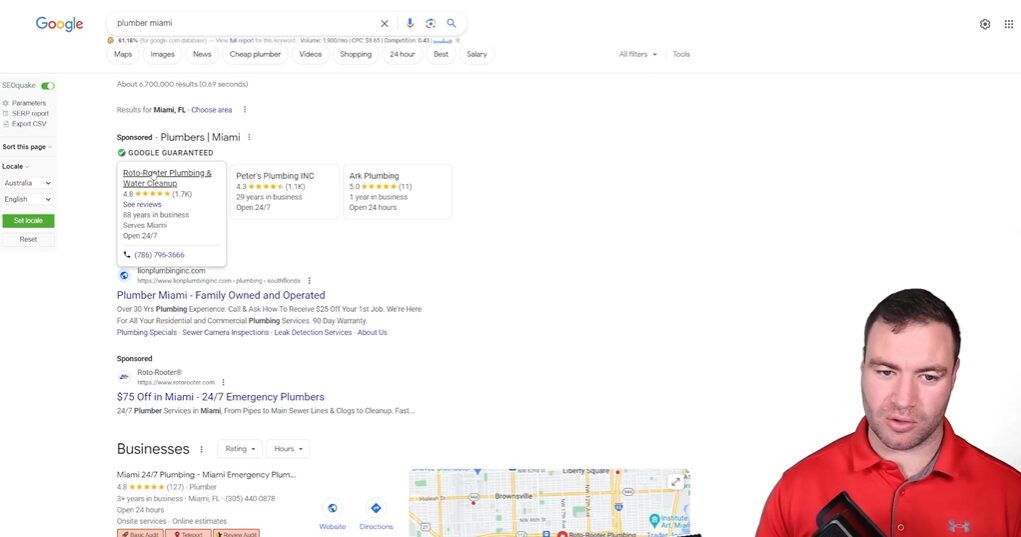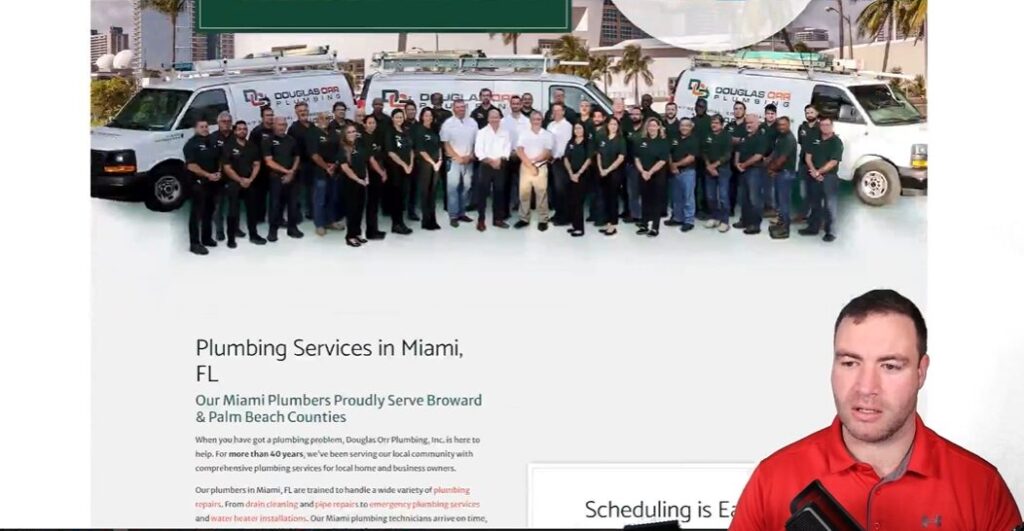When I first ventured into the world of digital marketing, I was bombarded with questions about the effectivity of good SEO. Each time, I found myself thinking, 'How can I convey its value without overwhelming anyone?' That’s when it hit me: it’s all about the right approach. Today, I'm excited to walk you through a tried-and-true process that any novice can use to see if SEO aligns with their business needs. So let’s explore more about this great topic.
TL;DR: This guide offers practical steps for evaluating how to tell if SEO is right for you and your business, complete with real examples and insights from the trenches.
Let’s dive into SEO, or Search Engine Optimization. What is SEO, you might ask? Simply put, it's the practice of enhancing your online presence so that search engines like Google can find your website more easily. This isn’t just a technical challenge; it's crucial for businesses in today’s digital age. In fact, SEO can be a game changer.
Investing in SEO is like planting a seed for future growth. Here are a few reasons why it matters:
You might be thinking, "How does SEO actually boost my online visibility?" It’s all about positioning and authority. Here’s another analogy: Think of SEO as your business card in a vast online marketplace. If it is well-designed and placed in the right spots, people will take notice. If not, it will gather dust at the bottom of a drawer.
When you optimize your website for search engines, you increase the chances of appearing in relevant searches. This visibility means more clicks, more leads, and ultimately, more sales. The more valuable content you provide, the better your chances of ranking high.
Now, let's clear up some common misconceptions. Some think, “SEO is a one-time task.” That's not correct. SEO is an ongoing process. It requires constant updating and optimization.
Others believe that SEO guarantees immediate results, but that's a myth. Realistically, it takes time to see substantial changes - often several months.
So, if you’re considering whether to invest in SEO, remember that it's not just about being found; it’s about being seen and trusted. And that certainly takes time and effort.
In my experience, by genuinely engaging in SEO, businesses can position themselves effectively in a crowded market. The key is to stay informed, be consistent, and adapt. That's how we can ensure long-term success in the digital space.

When I think about the essence of my business, I often start with a simple question: What services do I want to offer? Identifying your primary services and figuring out the right target keywords is crucial. It’s like building a house. You need a solid foundation first.
Here's how I do it:
By doing this, I get clarity on what I should focus on. Not only does it enhance my SEO strategy, but it also helps in attracting potential customers.
Now we dig deeper. Have you ever noticed how certain searches seem to pop up in your area?
This analysis helps me understand where the demand lies. It’s not just guesswork; it's data-driven action.
Let’s tackle a common misconception: "Not all businesses need SEO." Can you believe that?
Picture this: A bakery might think they don’t need SEO, but what happens when someone searches for "fresh pastries nearby?" Yes, that's a potential customer! Ignoring SEO is like closing the door on your potential clients. Even niche businesses can benefit from honing their online visibility.
In my experience, utilizing SEO strategies can open up numerous avenues, from increased traffic to enhanced credibility. If you're wondering whether you should invest in SEO, letting data guide you is essential. Don't underestimate the power of proper analysis.
By following these steps - identifying services, analyzing niche habits, and dispelling myths - you'll be better positioned to evaluate your business's SEO prospects. What are you waiting for? Dive in!

One of the most effective ways to unlock the potential of your business is through conducting a Google search for your target keywords. When I began my journey in digital marketing, this was the first step I took, and it opened my eyes to the opportunities out there.
Simply enter your desired keyword - like "plumber Miami" - into the search bar. It’s straightforward. But don’t stop there! What pops up? You’ll harness valuable insights from the results.
The map pack and the search engine results page (SERP) provide a ton of data. What did you notice? Every listing carries a story. I usually pay close attention to directories like Angie's List and Yelp—they're dominating! It's a sign of trust that we can't overlook.
What about niche industries? For instance, searching “staircase repair Miami” reveals not just competitors but their review counts. If they’re struggling in reviews, that's an opening for you! Think: Can I outperform them with better service or marketing?
Next, let’s focus on identifying your competitors. Take a closer look at the top players who aren't the big names. Visit their websites. Ask yourself:
SEO Quake can be useful here.Additionally, what can you discover from their strategies? A well-maintained site suggests that they’re investing effort - as you should too.
As we navigate this journey, remember: understanding your competition fuels your success. Analyzing search results and the landscape around us sheds light on the best paths to take. Take the time; it’s worth it! The insights you gain could lead to transformative strategies for engaging with your own audience.

Have you ever thought about what a single customer is worth to you? I find it vital to figure out your average customer job value. This figure can shape your SEO budget profoundly. For instance, let’s say you’re a plumber. If your average job earns you $250, knowing that number helps you make informed decisions.
Why does this matter? Well, if you can pull in 10 new customers through SEO, that’s a staggering $2,500! Understanding your average value can lead to a game-changing perspective on budget allocation.
Next up, we need to estimate potential leads from SEO efforts. I always start by entering my target keywords into Google. If we use "plumber Miami" as an example, there’s a world of data right at our fingertips. A quick glance at the monthly search volume gives you insights into how many leads are out there.
For example, if "plumber Miami" is searched 1,900 times a month, even securing a mere 5% of that traffic means you're getting around 95 leads monthly. And with a customer job value of $250, that’s a potential earnings boost of $23,750! It puts everything in perspective, doesn’t it?
This takes us to the final piece of the puzzle: the cost-benefit ratio of SEO. It’s no secret that SEO takes time and resources. But when you weigh costs against leads and potential earnings, the numbers can be pretty compelling.
If your SEO service costs $1,000 a month, yet it helps you land just one job worth $250, are you losing money? Not if you consider the long-term value of retaining those customers. They might not just pay once; they can come back, or refer others!
Consider this: if SEO generates consistently valuable traffic, your investment could pay for itself. Just like any business strategy, it requires careful assessment. Is it worth it? The answer could very well be a resounding “Yes!”
In my experience, if Google is a place where potential customers are searching for your services, then budgeting for SEO is typically a smart move. After all, it’s about adapting to the digital age - it's no longer optional, but essential.

SEO might seem complicated, but it doesn't have to be. I want to share the tools and resources that can simplify your SEO assessment journey. Getting started is easier than you think. First, know how to tell if SEO is right for you and your business. Let's break this down step by step.
Keyword research is a cornerstone of effective SEO. Luckily, plenty of free tools can help. For instance, Google Keyword Planner is great. It allows us to explore keyword ideas and see their search volume. Another tool is Ubersuggest. It's user-friendly and provides keyword suggestions along with data on competition.
But how do we know which keywords to target? Think about what your potential customers are searching for. Search for your main service or product. If I were looking for "plumber in Miami," I'd type that into Google and see what comes up. It tells us the competition level and what people find relevant. Isn’t that interesting?
Once you've got your keywords, it’s time to dive into Google’s usage data. Understanding this data is crucial. When we examine Google Analytics, we can see how visitors interact with our site. Are they bouncing off? Are they sticking around? This data provides insight into what's working and what isn’t.
For example, if I notice high traffic on a blog post about “how to fix a leaky faucet,” but low engagement, that could mean I need to improve the content or the call to action. It’s about fine-tuning our approach. It’s kind of like adjusting a recipe until it’s just right.
Reliable tools can make all the difference. I highly recommend checking out SEO Quake. This free Chrome extension gives quick access to a variety of metrics - like how many pages your competitors have indexed. It’s simple, powerful, and provides instant insights.
Also, consider using Ahrefs’ Webmaster Tools. This is more advanced but offers fantastic insights for free. You can see your backlinks and assess your site’s health. With these tools, we can track our progress consistently… and it’s absolutely essential for monitoring SEO efforts.
In my experience, utilizing these tools effectively can lead to significant improvements in your SEO strategy. Whether you’re checking keyword performance or analyzing competition, these resources will guide your path. With a little patience and strategic thinking, we can turn data into actionable results.

When I first started in SEO, I was eager to see quick results. I wanted to rank high immediately. It was tempting to jump in without a solid plan. But here’s the kicker: rushing into SEO could hurt more than help.
Have you ever hastily put together furniture without reading the instructions? The result often leads to missing screws or unstable pieces. Similarly, when you rush your SEO efforts, you risk damaging your website’s reputation. You might use spammy tactics to gain quick visibility. But guess what? Search engines like Google are smart. They can easily spot such tactics and penalize your site.
So, instead of hurrying, take a step back. Develop a coherent strategy. Understand your audience, and set realistic goals. Investing time in research will pay off in the long run.
Imagine trying to bake a cake without a recipe. You might go overboard with sugar and forget the flour. This is what happens when you evaluate ads and SEO without a solid strategy. You waste resources.
Before spending money on ads, test the waters with SEO. Identify what keywords are relevant to your business. Analyze the competition. If businesses are dropping cash on ads, it’s a sign there’s potential profit. But you don't want to jump in blindly. Make sure you have a clear understanding of your market first. Otherwise, your ad spend could just be a bottomless pit.
SEO isn't a sprint; it's a marathon. Think about the last time you tried to hurry through a long task. Did you miss anything important? That’s how good SEO works. You need to give it time.
Remember, patience leads to persistence, and this often yields great results. Keep refining your approach, and over time, you will see improvement.
In SEO, taking a measured, thoughtful approach is crucial. By avoiding these common pitfalls, you’ll be better equipped for success.

As we wrap up this discussion, let’s take a moment to reflect on the key points we’ve covered. Understanding SEO is essential for any business aiming to grow in today’s digital landscape. It’s not just about ranking high on Google; it’s about leveraging your visibility to attract potential customers. We explored how to analyze your market - by searching for keywords like "plumber Miami" to identify competition and potential profitability.
We also took a look at tools that can assist you. For instance, using Google’s search results to see who’s advertising and what organic listings pop up can provide invaluable insights into whether there's a viable market for you. You can use tools like Keywords Everywhere to better understand the search volumes and what those searches could mean in monetary terms for your business. Isn't that exciting? It’s all about making informed decisions based on the data available.
Now, I encourage you to take actionable steps. Don’t just sit and ponder the possibilities; implement what you’ve learned. Start by doing some basic keyword research, assess your competition, and consider how much traffic you could realistically capture. If the data looks promising, it might be time to invest in a professional SEO strategy.
It's crucial to remember that SEO isn’t a one-time task but an ongoing journey. The landscape is always shifting. What works today might not work six months from now. Hence, keeping a pulse on the changes in SEO and continuously optimizing your strategy is vital. Businesses that embrace this ongoing nature of SEO stand to benefit the most. So whether you're just starting out or you’ve been in the game for a while, be prepared to adapt and evolve.
In closing, make a plan, start with small steps, and don’t hesitate to reach out for help if you need it. There's a wealth of information out there, just waiting for you to tap into. Remember, if your potential clients are searching online for your services, investing in SEO could very well lead you to success. This article has helped you on how to tell if SEO is right for you and your business. Cheers to making wise decisions on your SEO path!